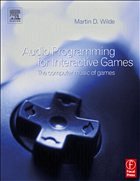
Audio Programming for Interactive Games
Versandkostenfrei!
Nicht lieferbar
Main description:Martin Wilde's cutting-edge exploration of the creative potential of game audio systems addresses the latest working methods of those involved in creating and programming immersive, interactive and non-linear audio for games. The book demonstrates how the game programmer can create an software system which enables the audio content provider (composer/sound designer) to maintain direct control over the composition and presentation of an interactive game soundtrack. This system (which is platform independent) is described step-by-step in Wilde's approachable style with illuminat...
Main description:
Martin Wilde's cutting-edge exploration of the creative potential of game audio systems addresses the latest working methods of those involved in creating and programming immersive, interactive and non-linear audio for games. The book demonstrates how the game programmer can create an software system which enables the audio content provider (composer/sound designer) to maintain direct control over the composition and presentation of an interactive game soundtrack. This system (which is platform independent) is described step-by-step in Wilde's approachable style with illuminating case studies, all source codes for which are provided on the accompanying CD-Rom which readers can use to develop their own audio engines.
As a programmer with experience of developing sound and music software engines for computer game titles on a multitude of platforms who is also an experienced musician, Martin Wilde is uniquely placed to address individuals approaching game audio from various levels and areas of expertise. Game audio programmers will learn how to achieve enable even better audio soundtracks and effects, while musicians who want to capitalise on this shift in roles will gain a greater appreciation of the technical issues involved, so enhancing their employment prospects. Students of game design can practice these skills by building their own game audio engines based on the source code provided.
- Learn from an expert: the author brings a unique perspective to this subject from his experience as both a programmer and a musician
- Develop your own game audio engines: the book and accompanying CD-ROM provide easy-to-follow instructions and coding which you can apply to your own game and multi-media projects
- Keep up with the latest working practices in this rapidly evolving industry with this essential guide for both game audio programmers and audio artists
Table of contents:
Introduction; Regarding audio; Overview of game audio APIs; Introduction to interactive game audio; Digital audio services; Interfacing with MIDI; Case study #1: Extending MIDI file performance; Building a software synth; Case study #2: Improving audio performance; Dynamic audio behaviour; Giving control to the audio artist; Case study #3: Audio/visual coordination; Future topics; Appendix A: Soundtrack manager script commands; Appendix B: Game audio resources
Martin Wilde's cutting-edge exploration of the creative potential of game audio systems addresses the latest working methods of those involved in creating and programming immersive, interactive and non-linear audio for games. The book demonstrates how the game programmer can create an software system which enables the audio content provider (composer/sound designer) to maintain direct control over the composition and presentation of an interactive game soundtrack. This system (which is platform independent) is described step-by-step in Wilde's approachable style with illuminating case studies, all source codes for which are provided on the accompanying CD-Rom which readers can use to develop their own audio engines.
As a programmer with experience of developing sound and music software engines for computer game titles on a multitude of platforms who is also an experienced musician, Martin Wilde is uniquely placed to address individuals approaching game audio from various levels and areas of expertise. Game audio programmers will learn how to achieve enable even better audio soundtracks and effects, while musicians who want to capitalise on this shift in roles will gain a greater appreciation of the technical issues involved, so enhancing their employment prospects. Students of game design can practice these skills by building their own game audio engines based on the source code provided.
- Learn from an expert: the author brings a unique perspective to this subject from his experience as both a programmer and a musician
- Develop your own game audio engines: the book and accompanying CD-ROM provide easy-to-follow instructions and coding which you can apply to your own game and multi-media projects
- Keep up with the latest working practices in this rapidly evolving industry with this essential guide for both game audio programmers and audio artists
Table of contents:
Introduction; Regarding audio; Overview of game audio APIs; Introduction to interactive game audio; Digital audio services; Interfacing with MIDI; Case study #1: Extending MIDI file performance; Building a software synth; Case study #2: Improving audio performance; Dynamic audio behaviour; Giving control to the audio artist; Case study #3: Audio/visual coordination; Future topics; Appendix A: Soundtrack manager script commands; Appendix B: Game audio resources



